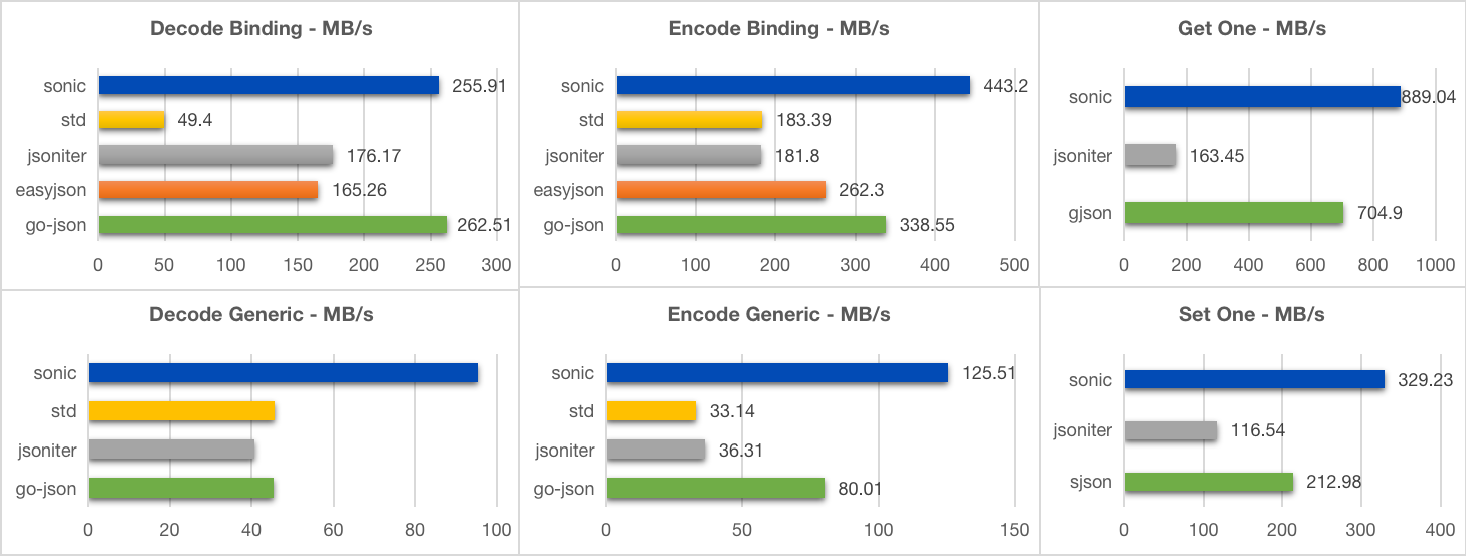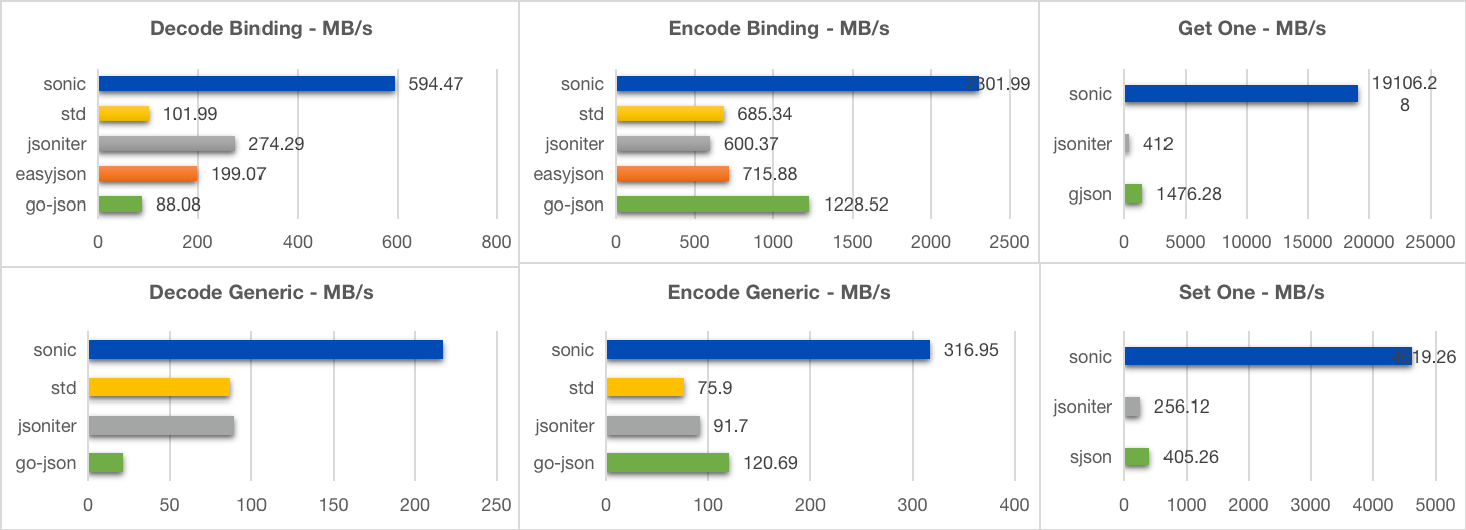English | 中文
A blazingly fast JSON serializing & deserializing library, accelerated by JIT (just-in-time compiling) and SIMD (single-instruction-multiple-data).
see go.dev
For all sizes of json and all scenarios of usage, Sonic performs best.
goversion: 1.17.1
goos: darwin
goarch: amd64
cpu: Intel(R) Core(TM) i9-9880H CPU @ 2.30GHz
BenchmarkEncoder_Generic_Sonic-16 32393 ns/op 402.40 MB/s 11965 B/op 4 allocs/op
BenchmarkEncoder_Generic_Sonic_Fast-16 21668 ns/op 601.57 MB/s 10940 B/op 4 allocs/op
BenchmarkEncoder_Generic_JsonIter-16 42168 ns/op 309.12 MB/s 14345 B/op 115 allocs/op
BenchmarkEncoder_Generic_GoJson-16 65189 ns/op 199.96 MB/s 23261 B/op 16 allocs/op
BenchmarkEncoder_Generic_StdLib-16 106322 ns/op 122.60 MB/s 49136 B/op 789 allocs/op
BenchmarkEncoder_Binding_Sonic-16 6269 ns/op 2079.26 MB/s 14173 B/op 4 allocs/op
BenchmarkEncoder_Binding_Sonic_Fast-16 5281 ns/op 2468.16 MB/s 12322 B/op 4 allocs/op
BenchmarkEncoder_Binding_JsonIter-16 20056 ns/op 649.93 MB/s 9488 B/op 2 allocs/op
BenchmarkEncoder_Binding_GoJson-16 8311 ns/op 1568.32 MB/s 9481 B/op 1 allocs/op
BenchmarkEncoder_Binding_StdLib-16 16448 ns/op 792.52 MB/s 9479 B/op 1 allocs/op
BenchmarkEncoder_Parallel_Generic_Sonic-16 6681 ns/op 1950.93 MB/s 12738 B/op 4 allocs/op
BenchmarkEncoder_Parallel_Generic_Sonic_Fast-16 4179 ns/op 3118.99 MB/s 10757 B/op 4 allocs/op
BenchmarkEncoder_Parallel_Generic_JsonIter-16 9861 ns/op 1321.84 MB/s 14362 B/op 115 allocs/op
BenchmarkEncoder_Parallel_Generic_GoJson-16 18850 ns/op 691.52 MB/s 23278 B/op 16 allocs/op
BenchmarkEncoder_Parallel_Generic_StdLib-16 45902 ns/op 283.97 MB/s 49174 B/op 789 allocs/op
BenchmarkEncoder_Parallel_Binding_Sonic-16 1480 ns/op 8810.09 MB/s 13049 B/op 4 allocs/op
BenchmarkEncoder_Parallel_Binding_Sonic_Fast-16 1209 ns/op 10785.23 MB/s 11546 B/op 4 allocs/op
BenchmarkEncoder_Parallel_Binding_JsonIter-16 6170 ns/op 2112.58 MB/s 9504 B/op 2 allocs/op
BenchmarkEncoder_Parallel_Binding_GoJson-16 3321 ns/op 3925.52 MB/s 9496 B/op 1 allocs/op
BenchmarkEncoder_Parallel_Binding_StdLib-16 3739 ns/op 3486.49 MB/s 9480 B/op 1 allocs/op
BenchmarkDecoder_Generic_Sonic-16 66812 ns/op 195.10 MB/s 57602 B/op 723 allocs/op
BenchmarkDecoder_Generic_Sonic_Fast-16 54523 ns/op 239.07 MB/s 49786 B/op 313 allocs/op
BenchmarkDecoder_Generic_StdLib-16 124260 ns/op 104.90 MB/s 50869 B/op 772 allocs/op
BenchmarkDecoder_Generic_JsonIter-16 91274 ns/op 142.81 MB/s 55782 B/op 1068 allocs/op
BenchmarkDecoder_Generic_GoJson-16 88569 ns/op 147.17 MB/s 66367 B/op 973 allocs/op
BenchmarkDecoder_Binding_Sonic-16 32557 ns/op 400.38 MB/s 28302 B/op 137 allocs/op
BenchmarkDecoder_Binding_Sonic_Fast-16 28649 ns/op 455.00 MB/s 24999 B/op 34 allocs/op
BenchmarkDecoder_Binding_StdLib-16 111437 ns/op 116.97 MB/s 10576 B/op 208 allocs/op
BenchmarkDecoder_Binding_JsonIter-16 35090 ns/op 371.48 MB/s 14673 B/op 385 allocs/op
BenchmarkDecoder_Binding_GoJson-16 28738 ns/op 453.59 MB/s 22039 B/op 49 allocs/op
BenchmarkDecoder_Parallel_Generic_Sonic-16 12321 ns/op 1057.91 MB/s 57233 B/op 723 allocs/op
BenchmarkDecoder_Parallel_Generic_Sonic_Fast-16 10644 ns/op 1224.64 MB/s 49362 B/op 313 allocs/op
BenchmarkDecoder_Parallel_Generic_StdLib-16 57587 ns/op 226.35 MB/s 50874 B/op 772 allocs/op
BenchmarkDecoder_Parallel_Generic_JsonIter-16 38666 ns/op 337.12 MB/s 55789 B/op 1068 allocs/op
BenchmarkDecoder_Parallel_Generic_GoJson-16 30259 ns/op 430.79 MB/s 66370 B/op 974 allocs/op
BenchmarkDecoder_Parallel_Binding_Sonic-16 5965 ns/op 2185.28 MB/s 27747 B/op 137 allocs/op
BenchmarkDecoder_Parallel_Binding_Sonic_Fast-16 5170 ns/op 2521.31 MB/s 24715 B/op 34 allocs/op
BenchmarkDecoder_Parallel_Binding_StdLib-16 27582 ns/op 472.58 MB/s 10576 B/op 208 allocs/op
BenchmarkDecoder_Parallel_Binding_JsonIter-16 13571 ns/op 960.51 MB/s 14685 B/op 385 allocs/op
BenchmarkDecoder_Parallel_Binding_GoJson-16 10031 ns/op 1299.51 MB/s 22111 B/op 49 allocs/op
BenchmarkGetOne_Sonic-16 3276 ns/op 3975.78 MB/s 24 B/op 1 allocs/op
BenchmarkGetOne_Gjson-16 9431 ns/op 1380.81 MB/s 0 B/op 0 allocs/op
BenchmarkGetOne_Jsoniter-16 51178 ns/op 254.46 MB/s 27936 B/op 647 allocs/op
BenchmarkGetOne_Parallel_Sonic-16 216.7 ns/op 60098.95 MB/s 24 B/op 1 allocs/op
BenchmarkGetOne_Parallel_Gjson-16 1076 ns/op 12098.62 MB/s 0 B/op 0 allocs/op
BenchmarkGetOne_Parallel_Jsoniter-16 17741 ns/op 734.06 MB/s 27945 B/op 647 allocs/op
BenchmarkSetOne_Sonic-16 9571 ns/op 1360.61 MB/s 1584 B/op 17 allocs/op
BenchmarkSetOne_Sjson-16 36456 ns/op 357.22 MB/s 52180 B/op 9 allocs/op
BenchmarkSetOne_Jsoniter-16 79475 ns/op 163.86 MB/s 45862 B/op 964 allocs/op
BenchmarkSetOne_Parallel_Sonic-16 850.9 ns/op 15305.31 MB/s 1584 B/op 17 allocs/op
BenchmarkSetOne_Parallel_Sjson-16 18194 ns/op 715.77 MB/s 52247 B/op 9 allocs/op
BenchmarkSetOne_Parallel_Jsoniter-16 33560 ns/op 388.05 MB/s 45892 B/op 964 allocs/op
BenchmarkLoadNode/LoadAll()-16 11384 ns/op 1143.93 MB/s 6307 B/op 25 allocs/op
BenchmarkLoadNode_Parallel/LoadAll()-16 5493 ns/op 2370.68 MB/s 7145 B/op 25 allocs/op
BenchmarkLoadNode/Interface()-16 17722 ns/op 734.85 MB/s 13323 B/op 88 allocs/op
BenchmarkLoadNode_Parallel/Interface()-16 10330 ns/op 1260.70 MB/s 15178 B/op 88 allocs/op

See bench.sh for benchmark codes.
See INTRODUCTION.md.
Default behaviors are mostly consistent with encoding/json, except HTML escaping form (see Escape HTML) and SortKeys feature (optional support see Sort Keys) that is NOT in conformity to RFC8259.
import "github.com/bytedance/sonic"
var data YourSchema
// Marshal
output, err := sonic.Marshal(&data)
// Unmarshal
err := sonic.Unmarshal(output, &data)Sonic supports decoding json from io.Reader or encoding objects into io.Writer, aims at handling multiple values as well as reducing memory consumption.
var o1 = map[string]interface{}{
"a": "b",
}
var o2 = 1
var w = bytes.NewBuffer(nil)
var enc = sonic.ConfigDefault.NewEncoder(w)
enc.Encode(o1)
enc.Encode(o2)
fmt.Println(w.String())
// Output:
// {"a":"b"}
// 1var o = map[string]interface{}{}
var r = strings.NewReader(`{"a":"b"}{"1":"2"}`)
var dec = sonic.ConfigDefault.NewDecoder(r)
dec.Decode(&o)
dec.Decode(&o)
fmt.Printf("%+v", o)
// Output:
// map[1:2 a:b]import "github.com/bytedance/sonic/decoder"
var input = `1`
var data interface{}
// default float64
dc := decoder.NewDecoder(input)
dc.Decode(&data) // data == float64(1)
// use json.Number
dc = decoder.NewDecoder(input)
dc.UseNumber()
dc.Decode(&data) // data == json.Number("1")
// use int64
dc = decoder.NewDecoder(input)
dc.UseInt64()
dc.Decode(&data) // data == int64(1)
root, err := sonic.GetFromString(input)
// Get json.Number
jn := root.Number()
jm := root.InterfaceUseNumber().(json.Number) // jn == jm
// Get float64
fn := root.Float64()
fm := root.Interface().(float64) // jn == jmOn account of the performance loss from sorting (roughly 10%), sonic doesn't enable this feature by default. If your component depends on it to work (like zstd), Use it like this:
import "github.com/bytedance/sonic"
import "github.com/bytedance/sonic/encoder"
// Binding map only
m := map[string]interface{}{}
v, err := encoder.Encode(m, encoder.SortMapKeys)
// Or ast.Node.SortKeys() before marshal
var root := sonic.Get(JSON)
err := root.SortKeys()On account of the performance loss (roughly 15%), sonic doesn't enable this feature by default. You can use encoder.EscapeHTML option to open this feature (align with encoding/json.HTMLEscape).
import "github.com/bytedance/sonic"
v := map[string]string{"&&":"<>"}
ret, err := Encode(v, EscapeHTML) // ret == `{"u0026u0026":{"X":"u003cu003e"}}`Sonic encodes primitive objects (struct/map...) as compact-format JSON by default, except marshaling json.RawMessage or json.Marshaler: sonic ensures validating their output JSON but DONOT compacting them for performance concerns. We provide the option encoder.CompactMarshaler to add compacting process.
If there invalid syntax in input JSON, sonic will return decoder.SyntaxError, which supports pretty-printing of error position
import "github.com/bytedance/sonic"
import "github.com/bytedance/sonic/decoder"
var data interface{}
err := sonic.UnmarshalString("[[[}]]", &data)
if err != nil {
/* One line by default */
println(e.Error()) // "Syntax error at index 3: invalid charnnt[[[}]]nt...^..n"
/* Pretty print */
if e, ok := err.(decoder.SyntaxError); ok {
/*Syntax error at index 3: invalid char
[[[}]]
...^..
*/
print(e.Description())
} else if me, ok := err.(*decoder.MismatchTypeError); ok {
// decoder.MismatchTypeError is new to Sonic v1.6.0
print(me.Description())
}
}If there a mismatch-typed value for a given key, sonic will report decoder.MismatchTypeError (if there are many, report the last one), but still skip wrong the value and keep decoding next JSON.
import "github.com/bytedance/sonic"
import "github.com/bytedance/sonic/decoder"
var data = struct{
A int
B int
}{}
err := UnmarshalString(`{"A":"1","B":1}`, &data)
println(err.Error()) // Mismatch type int with value string "at index 5: mismatched type with valuennt{"A":"1","B":1}nt.....^.........n"
fmt.Printf("%+v", data) // {A:0 B:1}Sonic/ast.Node is a completely self-contained AST for JSON. It implements serialization and deserialization both and provides robust APIs for obtaining and modification of generic data.
Search partial JSON by given paths, which must be non-negative integer or string, or nil
import "github.com/bytedance/sonic"
input := []byte(`{"key1":[{},{"key2":{"key3":[1,2,3]}}]}`)
// no path, returns entire json
root, err := sonic.Get(input)
raw := root.Raw() // == string(input)
// multiple paths
root, err := sonic.Get(input, "key1", 1, "key2")
sub := root.Get("key3").Index(2).Int64() // == 3Tip: since Index() uses offset to locate data, which is much faster than scanning like Get(), we suggest you use it as much as possible. And sonic also provides another API IndexOrGet() to underlying use offset as well as ensure the key is matched.
Searcher provides some options for user to meet different needs:
opts := ast.SearchOption{ CopyReturn: true ... }
val, err := sonic.GetWithOptions(JSON, opts, "key")ast.Node use Lazy-Load design, it doesn't support Concurrently-Read by default. If you want to read it concurrently, please specify it.Modify the json content by Set()/Unset()
import "github.com/bytedance/sonic"
// Set
exist, err := root.Set("key4", NewBool(true)) // exist == false
alias1 := root.Get("key4")
println(alias1.Valid()) // true
alias2 := root.Index(1)
println(alias1 == alias2) // true
// Unset
exist, err := root.UnsetByIndex(1) // exist == true
println(root.Get("key4").Check()) // "value not exist"To encode ast.Node as json, use MarshalJson() or json.Marshal() (MUST pass the node's pointer)
import (
"encoding/json"
"github.com/bytedance/sonic"
)
buf, err := root.MarshalJson()
println(string(buf)) // {"key1":[{},{"key2":{"key3":[1,2,3]}}]}
exp, err := json.Marshal(&root) // WARN: use pointer
println(string(buf) == string(exp)) // trueCheck(), Error(), Valid(), Exist()
Index(), Get(), IndexPair(), IndexOrGet(), GetByPath()
Int64(), Float64(), String(), Number(), Bool(), Map[UseNumber|UseNode](), Array[UseNumber|UseNode](), Interface[UseNumber|UseNode]()
NewRaw(), NewNumber(), NewNull(), NewBool(), NewString(), NewObject(), NewArray()
Values(), Properties(), ForEach(), SortKeys()
Set(), SetByIndex(), Add()
Sonic provides an advanced API for fully parsing JSON into non-standard types (neither struct not map[string]interface{}) without using any intermediate representation (ast.Node or interface{}). For example, you might have the following types which are like interface{} but actually not interface{}:
type UserNode interface {}
// the following types implement the UserNode interface.
type (
UserNull struct{}
UserBool struct{ Value bool }
UserInt64 struct{ Value int64 }
UserFloat64 struct{ Value float64 }
UserString struct{ Value string }
UserObject struct{ Value map[string]UserNode }
UserArray struct{ Value []UserNode }
)Sonic provides the following API to return the preorder traversal of a JSON AST. The ast.Visitor is a SAX style interface which is used in some C++ JSON library. You should implement ast.Visitor by yourself and pass it to ast.Preorder() method. In your visitor you can make your custom types to represent JSON values. There may be an O(n) space container (such as stack) in your visitor to record the object / array hierarchy.
func Preorder(str string, visitor Visitor, opts *VisitorOptions) error
type Visitor interface {
OnNull() error
OnBool(v bool) error
OnString(v string) error
OnInt64(v int64, n json.Number) error
OnFloat64(v float64, n json.Number) error
OnObjectBegin(capacity int) error
OnObjectKey(key string) error
OnObjectEnd() error
OnArrayBegin(capacity int) error
OnArrayEnd() error
}See ast/visitor.go for detailed usage. We also implement a demo visitor for UserNode in ast/visitor_test.go.
For developers who want to use sonic to meet diffirent scenarios, we provide some integrated configs as sonic.API
ConfigDefault: the sonic's default config (EscapeHTML=false,SortKeys=false...) to run sonic fast meanwhile ensure security.ConfigStd: the std-compatible config (EscapeHTML=true,SortKeys=true...)ConfigFastest: the fastest config (NoQuoteTextMarshaler=true) to run on sonic as fast as possible.
Sonic DOES NOT ensure to support all environments, due to the difficulty of developing high-performance codes. On non-sonic-supporting environment, the implementation will fall back to encoding/json. Thus beflow configs will all equal to ConfigStd.Since Sonic uses golang-asm as a JIT assembler, which is NOT very suitable for runtime compiling, first-hit running of a huge schema may cause request-timeout or even process-OOM. For better stability, we advise using Pretouch() for huge-schema or compact-memory applications before Marshal()/Unmarshal().
import (
"reflect"
"github.com/bytedance/sonic"
"github.com/bytedance/sonic/option"
)
func init() {
var v HugeStruct
// For most large types (nesting depth <= option.DefaultMaxIn